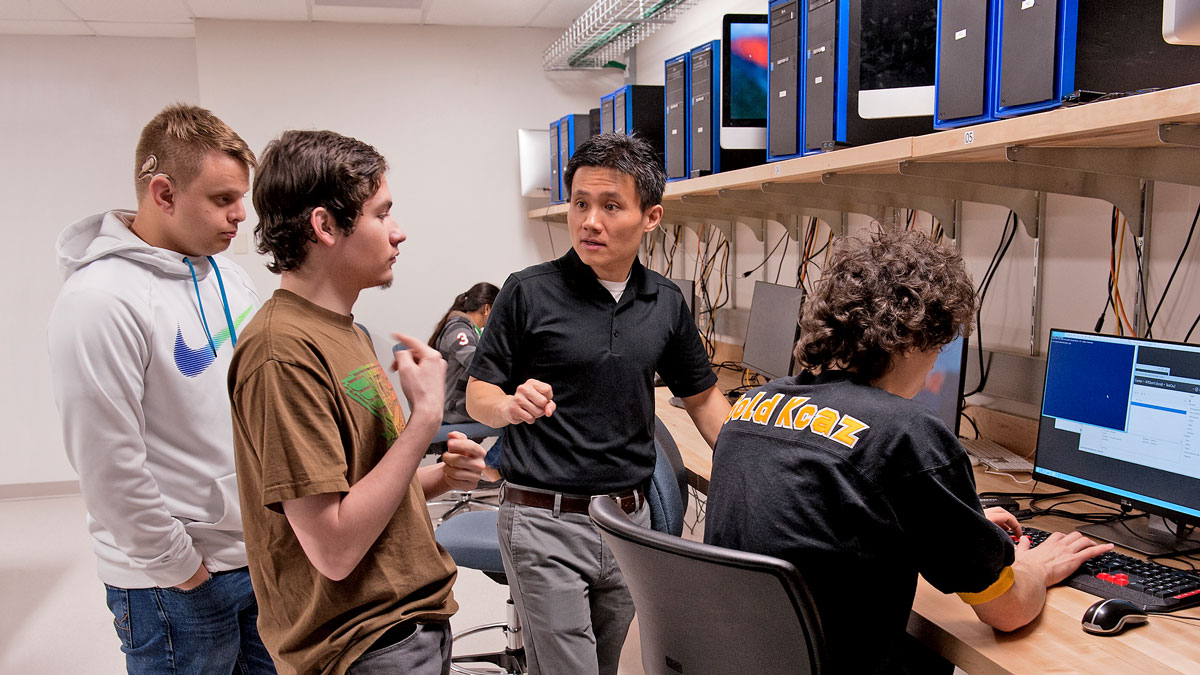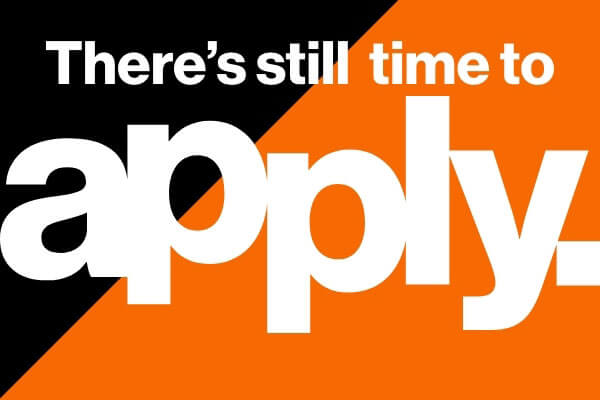Applied Computer Technology Associate in Applied Science Degree

Applied Computer Technology
Associate in Applied Science Degree
- RIT /
- Rochester Institute of Technology /
- Academics /
- Applied Computer Technology AAS
Overview for Applied Computer Technology AAS
Computers are important to all parts of the economy, and the number of careers that involve work with computers is constantly expanding. Students in the associate in applied science (AAS) degree program in applied computer technology take courses to prepare them for careers that involve maintaining computer software and hardware, installing and maintaining computer networks, and working with a variety of computer applications. This program is available for qualified deaf and hard of hearing students.
The associate in applied science (AAS) degree in applied computer technology, offered by RIT's National Technical Institute for the Deaf, leads to immediate entry-level positions in the computing industry. It prepares you for a career in computer support occupations that involves:
- Installing, maintaining, upgrading and repairing computer hardware and software.
- Networking and security that allows computers to be secured and safely communicate and share resources with one another.
Concentrations
As a student in the applied computer technology program, you will select an area to specialize in by choosing a program concentration in either computer technical support or networking and cyber security.
Computer Technical Support Concentration: If you select this concentration, you will develop skills specific to working with people to solve their computer-related problems. These skills prepare you to work at a help desk responding to client's computer problems, and perform setup, upgrades and repairs to computers and computer peripherals.
Networking and Cyber Security Concentration: If you select this concentration, you will develop skills specific to network and network security support, including server set-up, support and administration; network set-up, troubleshooting and repair; identifying and implementing security policies; and installing appropriate hardware and software to support a secure and robust network.
-
Join us for Fall 2026
There's still time to apply. For some programs, applications will be reviewed on a rolling, space-available basis.
Careers and Cooperative Education
Typical Job Titles
| Computer Technician | Computer Support Specialist | Network Technician |
| Network Security Technician | Network Administrator | Junior Web Developer |
Industries
-
Computer Networking
-
Internet and Software
-
Electronic and Computer Hardware
-
Manufacturing
-
Government (Local, State, Federal)
Cooperative Education
Cooperative education, or co-op for short, is full-time, paid work experience in your field of study. And it sets RIT graduates apart from their competitors. It’s exposure–early and often–to a variety of professional work environments, career paths, and industries. RIT co-op is designed for your success.
Students in the applied computer technology program are required to complete a cooperative education work experience prior to graduation. You may schedule your co-op after completing your second-year academic requirements.
Curriculum for 2025-2026 for Applied Computer Technology AAS
Current Students: See Curriculum Requirements
Admissions and Financial Aid
For the career-focused AAS degree
- 2 years of math required
- 1 year of science required
- English language skills as evidenced by application materials determine associate degree options.
Specific English, mathematics and science requirements and other recommendations
Successful completion of a sampling experience in applied computer technology, either through the Summer Vestibule Program or equivalent career exploration course, is a prerequisite for this program, as are the following:
- English: Placement into NENG-121 Bridge to Academic Literacies or above, including into a University Writing (UWRT) course. To earn the AAS degree, students must complete all necessary English coursework through UWRT-150 FYW: Writing Seminar.
- Mathematics: Placement into Mathematics in Society (NMTH-140) or a higher-level course. Typically, students entering this program will have completed at least three years of high school mathematics.
- Science: Typically, students entering this major will have completed at least two years of high school science.
- ACT (optional): The ACT middle 50% composite score is 14-17.
Financial Aid and Scholarships
100% of all incoming first-year and transfer students receive aid.
RIT’s personalized and comprehensive financial aid program includes scholarships, grants, loans, and campus employment programs. When all these are put to work, your actual cost may be much lower than the published estimated cost of attendance.
Learn more about financial aid and scholarships
Accreditation
Related News
-
October 7, 2022

NTID Career Fair helps deaf, hard-of-hearing students and alumni find co-ops, full-time jobs
More than 30 employers returned to the RIT/NTID campus since the start of the pandemic to recruit a new cohort of talented deaf and hard-of-hearing students and alumni for open co-op or full-time positions.
-
February 10, 2022

NTID alumnus stars in Oscar-nominated film ‘CODA’
RIT/NTID alumnus Daniel Durant ’11 (applied computer technology) is undoubtedly celebrating the latest accolades for the 2021 film CODA. Durant plays a major supporting role in the newly Oscar-nominated comedy-drama, a coming-of-age film.
-
May 6, 2020

RIT graduate Peter Yeung found perfect fit within university’s deaf community
Eight years ago, as a high school junior, Peter Yeung participated in NTID's Explore Your Future, a program that introduces deaf and hard-of-hearing high schoolers to career opportunities. Today, Yeung is an RIT/NTID graduate who has completed three degrees and has started his career as a user experience architect with the National Geospatial-Intelligence Agency in Springfield, Va.
Contact
- Brian Trager
- Department Chair
- National Technical Institute for the Deaf
- 585‑286‑5318
- brian.trager@rit.edu
Department of Information and Computing Studies













